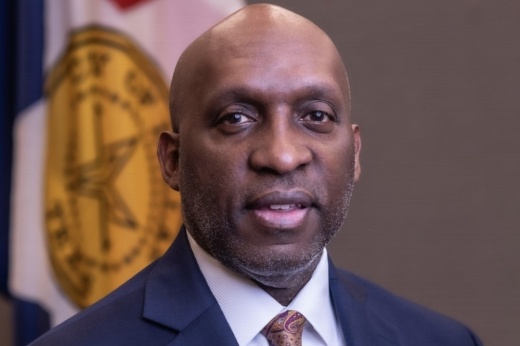Broadnax most recently served as city manager in Dallas. So far in Austin, he's moved to address his priority of finding a permanent police chief and named some of his Dallas staff to leadership positions at City Hall.
Broadnax spoke with Community Impact about his approach while serving as chief executive in the city's mayor-council form of government. This interview has been edited for length and clarity.
One of your first public actions here was opening up the search for the new police chief. Why was that important to get going right off the bat, and what does the right person look like?
Getting that position open and starting the national search was something I believe goes hand in hand with all the other work that the City Council and my team has been doing, particularly around trying to stabilize the police department, trying to get to a contract that the council can improve to support the men and women in the police service.
I need a strong leader that will command and have presence when it comes to where the community sees the department going, having some belief that whoever is selected is going to actually help us get there. Secondly, being responsive and understanding how this community wants to be policed, whether that's the level of accountability that they expect, the level of oversight that obviously they voted to make sure is embedded in how we approach policing in this community. And then that person's ability to work with myself and the City Council to make pivots and/or modify how they may approach their leadership, again, consistent with how the community wants them to be.
How you do you view the ongoing police contract process?
Our negotiating team that's sitting at the table with the association’s doing a great job. I don't see any change in course from the guidance and the direction that they've been given.
Part and parcel to why the negotiation of this contract and ultimate approval is important is because I think it will tease out and address the issues and challenges around Prop A that will allow us to implement the things that I think that voters had indicated they would like to see. And so that's why the final negotiations and getting this approved are important, because that will settle that issue.
The team is making steady progress. I think there is a goal stated by council to try to have this wrapped up by the end of July, and I think they are on a schedule to hopefully be able to do that.
How do you plan to keep infrastructure work on track, between local bond projects and things such as Project Connect, I-35 and the airport expansion?
The new project delivery department and their approach working to harmonize all the various departments and their capital expenditures, I think that's going to go a long way to help us meet what I believe the community has expected. And that is the timeliness in us delivering projects that ... they voted on to have be put in the ground and/or built.
It's going to come with constant communication. I'm sure that ultimately if it's not already in place, we’re going to develop the appropriate dashboards so folks will get a real-time and timely understanding of where we're at with all of those construction projects.
What's your plan for addressing homelessness?
We just spent 18 hours last week at a council meeting talking about the underlying issue of affordability and housing. And so that's also a dynamic in the conversation of homelessness, is just the availability of housing at a level that people can afford.
Beyond the sheltering ... there's a lot of work our team is doing with those folk in those encampments to provide wraparound services to try to help them get in to housing. And so we need to figure out how to, whether that's master leasing programs and other things of that nature, to actually transition people that are ready for housing into housing at the same time we're building the pipeline of permanent supportive housing and more shelter space if needed.
I think as the council has tried to do, and that I'm going to look at refocusing how we go about it, getting the assessment of where we're spending the $80 [million]-$90 million dollars-plus in resources for homelessness. ... We also have to develop a long-term plan for how we're going to reduce homelessness in this community and how we're going to deal with all elements of the continuum of homelessness.
How will you tackle the next budget and related financial constraints?
Much of that work has already begun prior to me being here. And so looking forward to distilling some of the work that's already been done, but also putting my own lens on how we're going to approach the budget. One thing that I'm hopeful to commit to council is that the budget that we’ll hopefully have them adopt will be sustainable not just for the year that we're in but for the next year, and then come back and make sure we can update that. I'm proposing at this point a two-years balanced budget as a goal of mine. And so I'll be working with the team to see what that looks like this summer.
How are you going to work to make sure folks have good interactions with the city of Austin, whether it’s calling 911 or in development services?
I believe a fundamental baseline is we've got to perform and do work that ensures that those basic expectations of service delivery are met. But that shouldn't be all we focus on because people obviously expect and want more than just the basics. And so it's my job to not just deliver a quality product at the level of what people expect but to try to exceed those.





